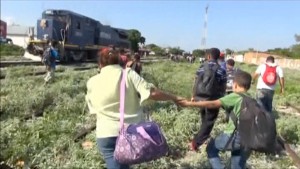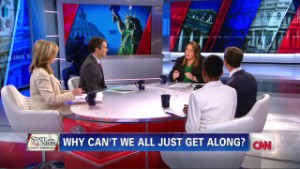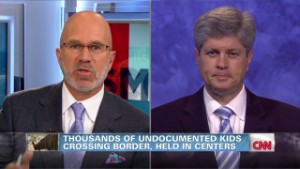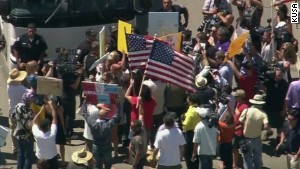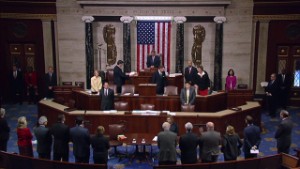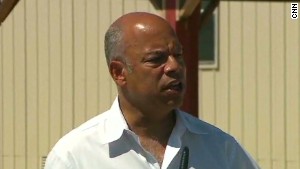
Critics are saying that President Vladimir V. Putin overreached by suggesting that Russia could thrive without the West. Pool photo by Mikhail Klimentyev
MOSCOW — Russia, facing the toughest round of Western sanctions imposed since the Ukraine crisis erupted, has adopted a nonchalant public stance, with President Vladimir V. Putin emphasizing the importance of self-reliance and a new poll released Tuesday indicating a “What, me worry?” attitude among the bulk of the population.
But beneath that calm facade, there is growing alarm in Russia that the festering turmoil in Ukraine and the new round of far more punitive sanctions — announced Tuesday by both European nations and the United States — will have an impact on Russia’s relations with the West for years to come and damage the economy to the extent that ordinary Russians feel it.
Until now, Mr. Putin’s tactics seemed to be working. Russia was feeding the separatist insurgency in Ukraine without leaving distinct fingerprints — able to press Kiev to come to terms while avoiding a rupture with Europe that would alienate Russia’s business elite. But that strategy is beginning to crumble, battered under successive shock waves generated by the crisis.
GRAPHIC
How Much Europe Depends on Russian Energy
Map of European energy imports that come from Russia.

More frequent and prominent critics are saying that Mr. Putin and the hard-line leaders in the Kremlin overreached by suggesting that Russia, far more dependent than the old Soviet Union on international trade and financial markets, could thrive without the West.
“They were not anticipating the West to make radical moves, costly moves,” said Nikolai Petrov, an independent political analyst. “What is happening is different from what they wanted and what they expected.”
He and others pointed to the downing of the Malaysia Airlines Boeing 777 over embattled southeastern Ukraine on July 17 as upsetting the balancing act that Mr. Putin had managed to pull off to maintain support from the public, hard-line nationalists, the security services, the oligarchs and the more liberal business community.
“Until this catastrophe, Putin’s calculations were pretty good in terms of being able to win any tactical battle,” Mr. Petrov said.
The Kremlin had been counting on its ability to maintain just enough instability in Ukraine to keep the country dependent on Russian good will, while making Europe and the United States cautious about intervening too assertively there.
Right after this weekend, when the likelihood of more serious European sanctions materialized, Mr. Putin met with advisers to say that Russia needed to become self-reliant. He was referring to arms production previously done in Ukraine, but the sentiment echoed in other fields.
“No matter what the difficulties we may encounter, and to be honest, I do not really see any big difficulties so far,” he said, according to a transcript on the Kremlin website, “I think that they will ultimately work to our advantage because they will give us the needed incentive to develop our production capability in areas where we had not done so yet.”
Domestically, grumbling over the creeping isolationism has grown louder. Roughly 50 percent of the economy is state-run, and the loyalty of those who direct such companies to Mr. Putin remains absolute. But the rest are changing.
“It is still a very polite version: ‘Maybe something is going wrong,’ ” said Sergei Petrov, an opposition member of Parliament and the founder of Rolf, one of the biggest car importers in Russia. “They would never say it to you, a foreigner, but I hear more and more critics.”
A former finance minister and a close Putin ally, Alexei Kudrin, voiced rare public criticism of Kremlin policy in an interview last week with the state-run news agency ITAR-TASS.
Mr. Kudrin said he was worried that the Ukraine crisis would drive Russia into a “historic confrontation” that would retard the country’s development across the board.
The business community was dismayed by the amount of anti-Western comments on television and radio, he said, indicating a “fundamental” shift that made the West Russia’s adversary again.
“Things are different in business,” he said. “Businessmen want to work, to invest, build factories and develop trade.”
Some analysts saw that interview as a sign that Mr. Putin was looking for a way out, preparing to abandon the Ukraine separatists publicly. They linked it to a similar sentiment in a column in the newspaper Kommersant on Tuesday, by a journalist close to the president, suggesting that he had allowed the black boxes from the Malaysian airliner to be sent to the West because he did not fully trust the information he got from his advisers.
But there has been no direct indication from Mr. Putin that he wants to change tacks.

Kerry Meets Ukraine’s Foreign Minister
Secretary of State John Kerry and Pavlo Klimkin, Ukraine’s foreign minister, spoke after meeting in Washington to discuss the conflict in Ukraine.
July 29, 2014. Win Mcnamee/Getty Images
Officially, Russia tried to play down the airplane disaster, which killed all 298 people on board, although some news outlets raised questions from the start. The front page of the government-owned Russkaya Gazeta the day after the crash put the report on the bottom half — the top story was that Russians were eating less bread and potatoes.
The general sense here was that the West was again piling on Russia without evidence — that it was a political issue.
“In my opinion, we face a critical situation today,” Lev Gudkov, the director of the Levada Center, an independent polling organization, told a weekend seminar audience. “But our society does not realize it against a backdrop of patriotic and chauvinistic euphoria.”
That euphoria was rooted in the relatively bloodless, seemingly costless annexation of Crimea in March. The public expected that the rest of the crisis in Ukraine would be resolved with similar ease.
“The situation began changing dramatically after the crash of the Boeing,” Mr. Gudkov said. “According to our research, reaction inside the country was quite weak, but the Western European public has drastically changed its attitude towards Russia.”
Indeed, poll results released Tuesday by the Levada Center showed the Russian public barely concerned about sanctions. More than 60 percent of respondents thought they would have little or no impact on them. Mr. Putin remains hugely popular.
The official attitude was also calm. “We can’t ignore it,” the foreign minister, Sergey V. Lavrov, said at a news conference on Monday when asked about the expected sanctions. “But to fall into hysterics and respond to a blow with a blow is not worthy of a major country.”
Mr. Lavrov also expressed disappointment that the Ukraine crisis was damaging relations between Russia and the West, but said repeatedly that it was the fault of Western capitals because they had encouraged Kiev to fight rather than negotiate.
“No one is pleased with the deterioration of relations between the partners,” he said. “We are trying to influence the situation in Ukraine to move it from the military confrontation to political negotiations.”
But others were less sanguine as the sanctions piled up.
Beyond sanctions, an arbitration court in The Hague ruled Monday that Russia should pay former Yukos shareholders $50 billion for breaking up the oil and gas company decade ago. The ruling added an element of uncertainly to dealing with Gazprom and Rosneft, the two state-controlled giants of the Russian energy economy that absorbed Yukos holdings.
Economic issues are likely to broaden the split between the more liberal economists and the conservative members of the security services, analysts said. Mr. Putin makes all the crucial decisions, however, and no one is likely to challenge him directly.
“There is a split, but the antiwar party lacks the instruments to force Putin into practical action,” said Vladimir Milov, a former deputy energy minister turned opposition politician.
Kremlin officials seeking to break with the West believe that whatever financing they lose there, they can regain from China or India, Mr. Milov said, without realizing that neither banking system is geared to provide the billions in long-term credit that Russian companies routinely got from Western banks.
Indeed, at a recent dinner party, a Kremlin confidant said that the future would be all about “Russian might and Chinese wealth.” Did the West not worry, he mused aloud, that China would be the big winner?
Over all, Mr. Milov said, the outlook seems bleak.
“We are sliding into something which is clearly becoming a long-term standoff, and Putin looks committed and not ready to give up,” he said. “It is a bad sign that everything is becoming a long-term problem.”








